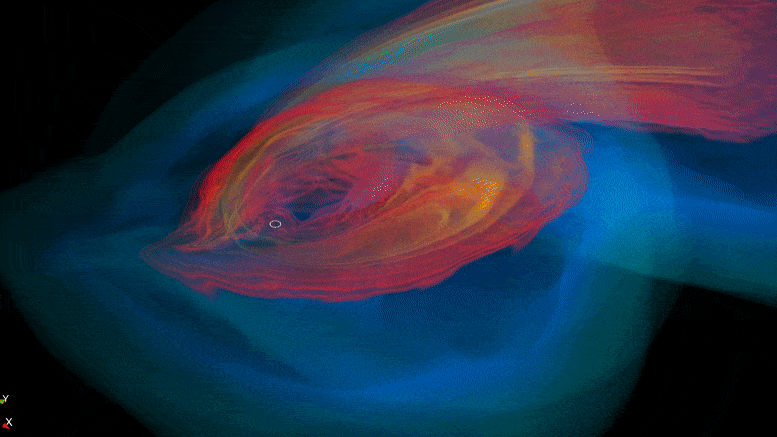
Computer simulation of the disruption of a star by a black hole shows the formation of an eccentric accretion disk of stellar material spiraling into the black hole. This image from a video of the simulation shows the early stage in the formation of the disk. Credit: Jamie Law-Smith and Enrico Ramirez-Ruiz
First clear confirmation of accretion disk formation in a tidal disruption event without x-ray emissions supports theoretical predictions.
“My jaw dropped, and I immediately knew this was going to be interesting.” — Ryan Foley
In case you are keeping track:
Can a black hole fire up the cold heart of the Phoenix Galaxy Cluster? -- ScienceDaily
Radio astronomers have detected jets of hot gas blasted out by a black hole in the galaxy at the heart of the Phoenix Galaxy Cluster, located 5.9 billion light-years away in the constellation Phoenix. This is an important result for understanding the coevolution of galaxies, gas, and black holes in galaxy clusters.
Galaxies are not distributed randomly in space. Through mutual gravitational attraction, galaxies gather together to form collections known as clusters. The space between galaxies is not entirely empty. There is very dilute gas throughout a cluster which can be detected by X-ray observations.
Black hole 'hair' could be detected using ripples in space-time | Space
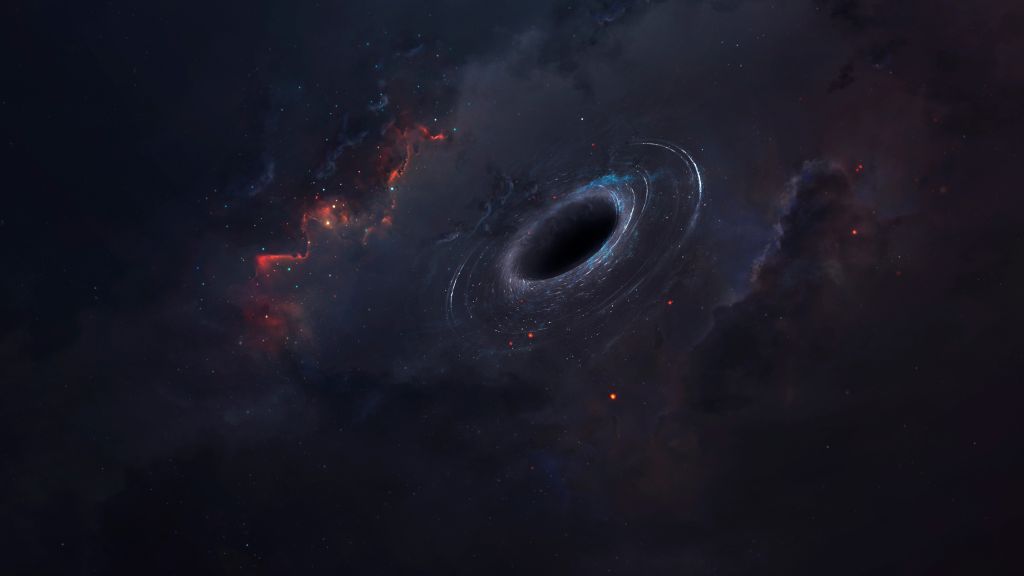
The information locked inside black holes could be detected by feeling their 'hair,' new research suggests.
As far as we understand them (which, admittedly, is not very much), black holes are suspiciously simple objects. Regardless of what falls in, whether stars, clouds of gas and dust, or your worst enemies, black holes can be described by three and only three simple numbers: charge, mass and spin.
That means that if you had two black holes of the exact same size, exact same electric charge, and spinning at exactly the same rate, you wouldn't be able to tell them apart. The reason this is suspicious is that something had to happen to all that juicy information that fell into those two black holes. Did it get destroyed? Lost below the event horizon? Stuck in some inaccessible portion of the universe?
Spinning black hole powers jet by magnetic flux -- ScienceDaily
Black holes are at the center of almost all galaxies that have been studied so far. They have an unimaginably large mass and therefore attract matter, gas and even light. But they can also emit matter in the form of plasma jets -- a kind of plasma beam that is ejected from the centre of the galaxy with tremendous energy. A plasma jet can extend several hundred thousand light years far into space.
When this intense radiation is emitted, the black hole remains hidden because the light rays near it are strongly bent leading to the appearance of a shadow. This was recently reported by researchers of the Event Horizon Telescope (EHT) collaboration for the massive black hole in the giant ellipse galaxy M87.
While you're here, how about this:
Jets of Hot Gas Detected Blasting Out From Black Hole at the Heart of the Phoenix Galaxy Cluster
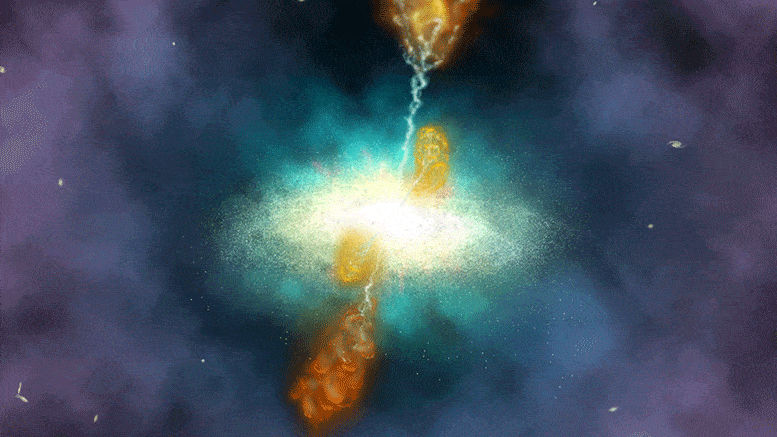
Galaxies are not distributed randomly in space. Through mutual gravitational attraction, galaxies gather together to form collections known as clusters. The space between galaxies is not entirely empty. There is very dilute gas throughout a cluster which can be detected by X-ray observations.
If this intra-cluster gas cooled, it would condense under its own gravity to form stars at the center of the cluster. However, cooled gas and stars are not usually observed in the hearts of nearby clusters, indicating that some mechanism must be heating the intra-cluster gas and preventing star formation. One potential candidate for the heat source is jets of high-speed gas accelerated by a super-massive black hole in the central galaxy.
"Invisible Chimney" Phenomenon Explained: Spinning Black Hole Powers Jet by Magnetic Flux
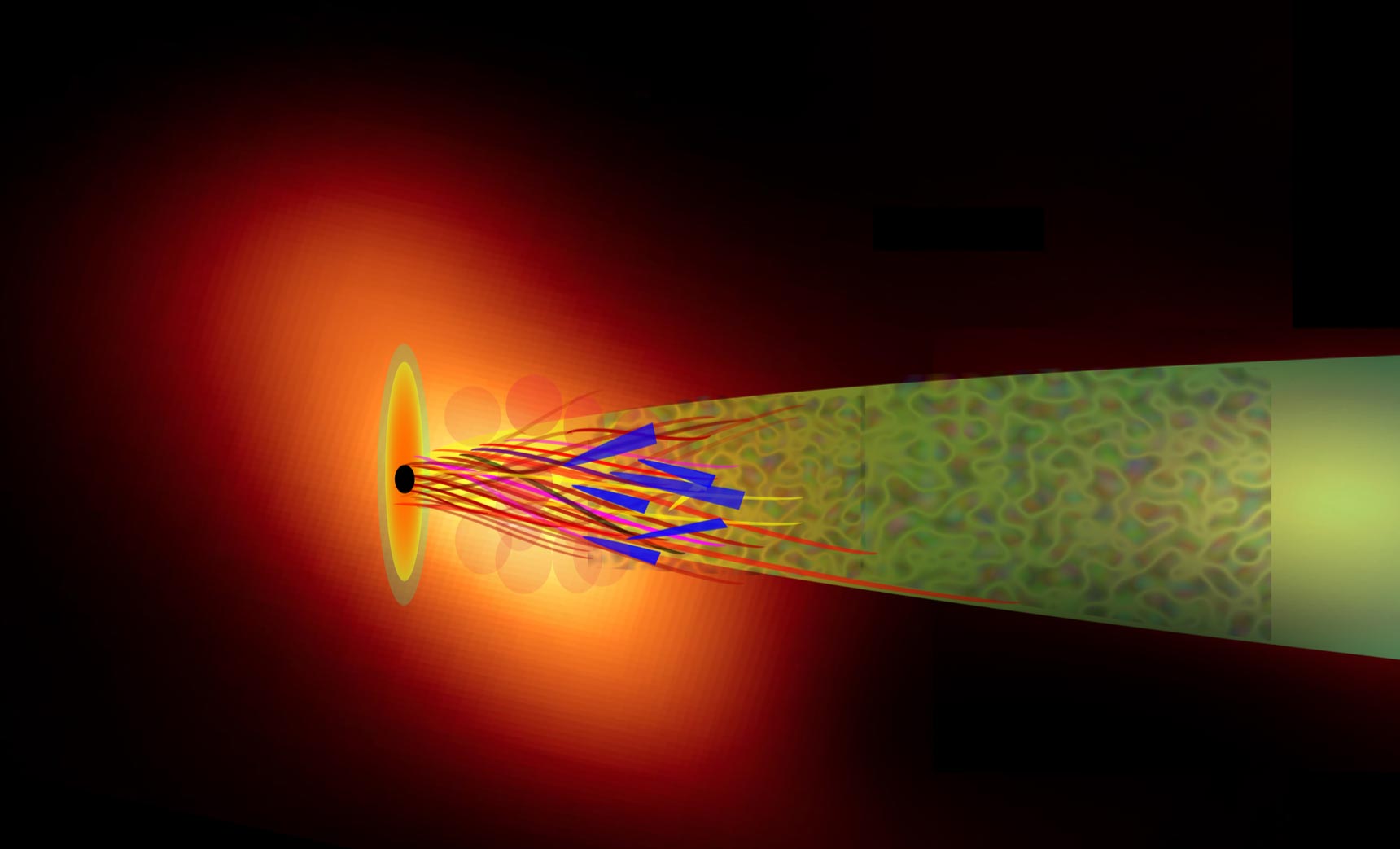
The center of quasar 3C279 emits flickering gamma radiation, which is characteristic of the phenomenon of magnetic reconnection. Credit: Amit Shukla / Indian Institute of Technology Indore
A new letter has been found in the mysterious alphabet of black holes. Two astrophysicists share this discovery in the journal Nature Communications.
In quasar 3C279 – also a black hole – the EHT team found another phenomenon: At a distance of more than a thousand times the shadow of the black hole, the core of a plasma jet suddenly lit up. How the energy for this jet could get there as if through an invisible chimney was not yet known.
A Black Hole Paradox Where Relativity and Quantum Physics Meet - The Wire Science
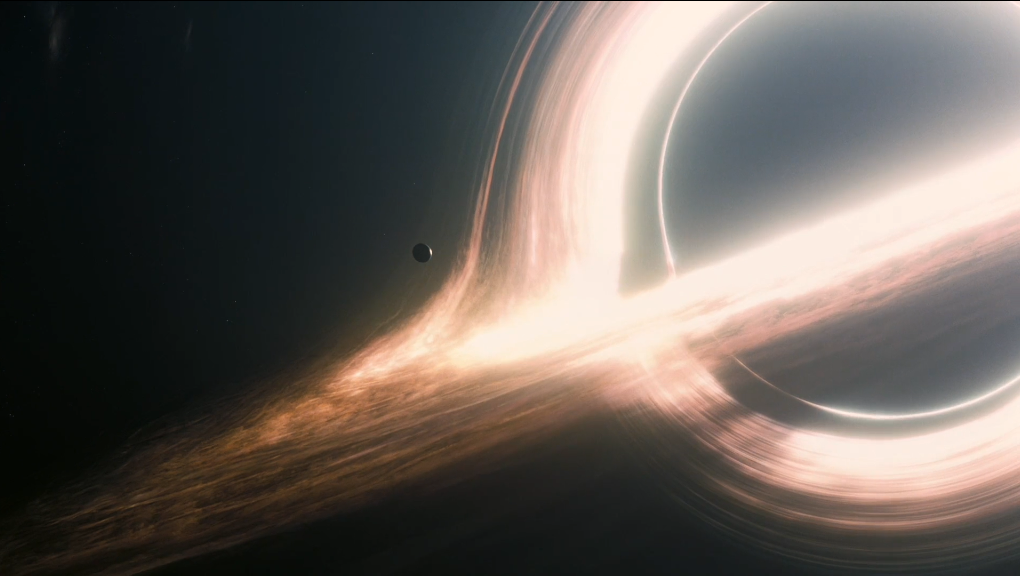
Imagine a man goes inside a room and gets locked in. The police arrive at the scene and go in to find no trace of the man. Instead there are some bricks, a coffee machine and a dictionary (or any other set of random items) whose combined weight equals that of the man. Mass has been conserved – but without any trace of the man himself, no one can figure out his identity or how he vanished.
* * *
A very fundamental law of physics says that quantum information can never disappear. But this is precisely what seems to happen in black holes. An inevitable consequence of several fundamental laws of physics is that heat must be released into space from near the black hole. This in turn should cause the black hole to shrink. As more heat is released, slowly, over time, the black hole will eventually disappear – leaving nothing behind but heat.
Home but not alone: A coronavirus diary | Entry 26: Black hole anxiety?

My son came home crying about black holes, after his friend told him they are in space like the sun and suck up everything until there’s nothing. I soothed and promised that we don’t have to worry about black holes. Then, I remembered it was 2020.
My son came home crying about black holes. His neighbor friend told him they are in space like the sun and suck up everything until there’s nothing (“it cr-cr-crushes your bones, mom!”).
Happening on Twitter
This is a pretty jaw dropping story on Facebook's theoretically neutral policy chief guiding the social network in… https://t.co/9BhCtC2aUt eliotwb (from San Francisco, CA) Sun Aug 30 17:48:44 +0000 2020
Here Is The Jaw-Dropping Amount Of Money Each BTS Member Made Last Year https://t.co/bhI2CX2fVB Koreaboo (from Worldwide) Sun Aug 30 13:40:00 +0000 2020
This is amazing. It's jaw dropping, even from this guy. https://t.co/PunBQoAzEC redsteeze (from New York City of Brooklyn) Sun Aug 30 06:15:28 +0000 2020
Amazon Halo, a new wearable band and membership, helps you improve your health and wellness. @Forbes has the story… https://t.co/9sfE2nN96S amazonnews (from United States) Sun Aug 30 16:58:34 +0000 2020
No comments:
Post a Comment